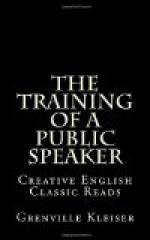As nothing else gives so great a sanction to the authority of the speaker as to be free from all suspicion of avarice, hatred, and ambition, so, also, there is a sort of tacit recommendation of ourselves if we profess our weak state and inability for contending with the superior genius and talents of the advocate of the other side. We are naturally disposed to favor the weak and opprest, and a conscientious judge hears an orator willingly whom he presumes not to be capable of making him swerve from his fixt purpose of doing justice. Hence the care of the ancients for concealing their talents.
IDEAS TO AVOID AND TO INCLUDE
All contemptuous, spiteful, haughty, calumniating expressions must be avoided and not so much as even insinuated to the defamation of any particular person or rank, much less against those to whom an affront would alienate the minds of the judges. To be so imprudent as to attack judges themselves, not openly, but in any indirect manner, would be most unwise.
The advocate for the other side may likewise furnish sufficient matter for an exordium. Sometimes honorable mention may be made of him, as when we pretend to be in dread of his interest and eloquence in order to make them suspected by the judges, and sometimes by casting odium on him, altho this must be done very seldom. I rather think, from the authority of the best authors, that whatever affects the orator, affects also the cause he patronizes, as it is natural for a judge to give more credit to those whom he more willingly hears.
We shall procure the favor of the judge not so much by praising him, which ought to be done with moderation, and is common to both sides, but rather by making his praise fitting, and connecting it with the interest of our cause. Thus, in speaking for a person of consequence, we may lay some stress on the judge’s own dignity; for one of mean condition, on his justice; for the unhappy, on his mercy; for the injured, on his severity.
STUDYING YOUR HEARERS
It also would not be amiss to become acquainted, if possible, with his character. For, according as his temper is, harsh or mild, pleasant or grave, severe or easy, the cause should be made to incline toward the side which corresponds with his disposition, or to admit some mitigation or softening where it runs counter to it.
It may happen sometimes, too, that the judge is our enemy, or the opponent’s friend. This is a circumstance requiring the circumspection of both parties, yet I think the favored advocate should behave with great caution, for a judge of a biased disposition will sometimes choose to pass sentence against his friends, or in favor of those to whom he bears enmity, that he may not appear to act with injustice.
AROUSING EMOTIONS
Judges have also their private opinions and prejudices, which we must either strengthen or weaken, according as we see necessary. Fear, too, sometimes must be removed, as Cicero, in his defense of Milo, endeavors to assure the judges that Pompey’s army, drawn up about the Forum, is for their protection; and sometimes there will be an occasion to intimidate them, as the same orator does in one of his pleadings against Verres.




